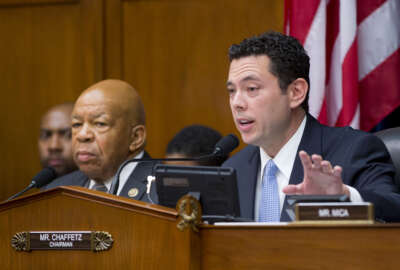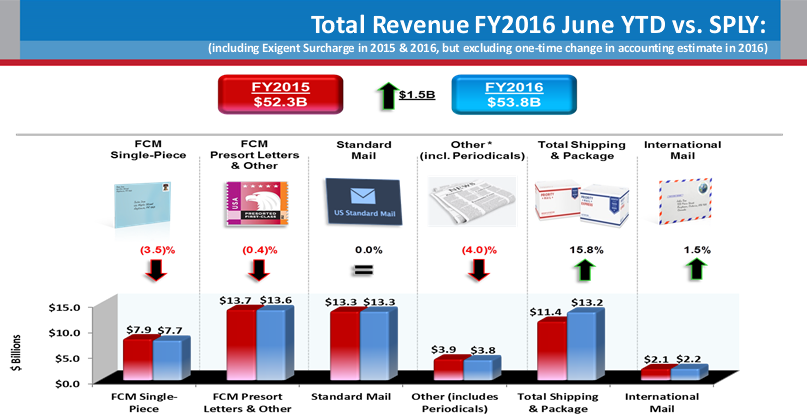
USPS counts on ‘broad bipartisan support’ for reform amid losses
The U.S. Postal Service says it has "broad bipartisan support" from Congress to ease some its financial burdens. But until that time comes, USPS doesn't have much...
The U.S. Postal Service says it has “broad bipartisan support” from Congress to ease some of its financial burdens. But until that time comes, USPS doesn’t have much room to improve the situation it’s in.
The Postal Service suffered a $1.6 billion third-quarter net loss, thanks in part to the Postal Regulatory Commission’s rollback of the exigent postal rate surcharge on April 10.
The surcharge, which PRC introduced for USPS to recoup revenue lost from the 2008 recession, raised the cost of postage stamps from 47 cents to 49 cents.
The Postal Service projects it lost $450 million in revenue this quarter without the surcharge, and expects to lose $2 billion annually.
Overall, the Postal Service reported $16.6 billion in operating revenue for the third quarter, an increase of $117 million compared to the previous fiscal year.
Increased shipping and packages revenue grew by 18 percent (to $645 million), and offset a 5.5 percent decrease in first-class mail revenue ($379 million).
However, Chief Financial Officer John Corbett said the results still don’t alter the Postal Service’s overall financial picture.
“But at the end of each quarter and each year, the picture is the same: while we have been successful replacing higher-margin first-class mail revenue declines with growth in lower-margin shipping and package services, and to a lesser extent, with our success on the standard mail advertising side, we are unable to generate enough cash to pay all of our expenses,” Corbett said.
Postmaster General Megan Brennan told reporters Tuesday the postal reform bill that made it through the House Oversight and Government Reform Committee in June would improve USPS’ financial outlook by addressing its mandate to pre-fund healthcare for hundreds of thousands of postal employees.
“We appreciate that we got that bill out of committee with unanimous consent, which means that we have broad bipartisan support, and we’re looking forward to the legislative process moving forward,” Brennan said in a conference call announcing the Postal Service’s third-quarter financials.
The bill would create postal-specific health plans that would require integration into Medicare.
Sen. Tom Carper (D-Del.), who introduced his own postal reform bill in September, said the Postal Service’s dire financial situation has gone untreated for too long.
“Despite rises in revenue and shipping volume, the Postal Service is, yet again, reporting significant losses. The agency’s latest financial report forecasts a reality we’ve known for years — without congressional action, the Postal Service will remain unable to raise enough revenue to cover its costs and will continue to suffer losses that threaten its long-term viability. Each quarter, these reports underscore the Postal Service’s dire situation and remind us that doing nothing cannot be an option,” Carper said in a statement Tuesday.
Fredric Rolando, president of the National Association of Letter Carriers, called on Congress to improve the Postal Service’s financial situation.
“Both the pre-funding and rate issues can be readily addressed if Congress acts on practical, targeted postal reform. There is a strong consensus within a coalition consisting of the Postal Service, postal unions, businesses, mailers and industry groups, as well as key legislators, for a reform package that all stakeholders can buy into, including addressing pre-funding, allowing USPS to use its invaluable networks for some new products and services, and adopting best private-sector practices in investing the USPS retiree health benefits fund,” Rolando said in a statement. “Our coalition will work with Congress to overcome the short-term impact of the rate roll-back and move legislation this year.

For the fourth quarter, Brennan she expects a “robust” fall season with political mail, followed by increased package volume during the holiday season.
“As the economy continues to improve from the worst recession in 80 years, letter revenue is largely stabilizing,” Rolando said. “And as the Internet drives online shopping, package revenue is skyrocketing, auguring well for the future.”
Copyright © 2025 Federal News Network. All rights reserved. This website is not intended for users located within the European Economic Area.
Jory Heckman is a reporter at Federal News Network covering U.S. Postal Service, IRS, big data and technology issues.
Follow @jheckmanWFED




